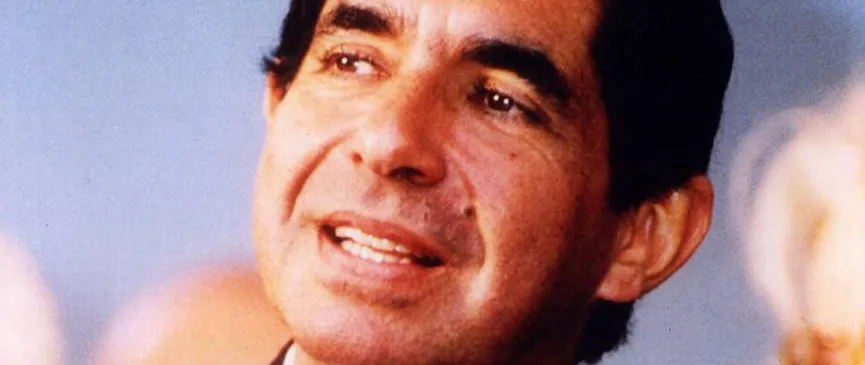Main content
Óscar Arias Prince of Asturias Award for International Cooperation 1988

Óscar Arias Sánchez (Heredia, Costa Rica, 1940 - ), former president of the Republic of Costa Rica (1986-1990 and 2006-2010), lawyer, economist, political scientist and businessman, received the 1987 Nobel Peace Prize for his participation in the peace processes in the armed conflicts of Central America in the 1980s, especially because of his opposition to US support in the Nicaraguan Contras conflict.
After studying Economics and Law at the University of Costa Rica, he went to London in 1967 with a grant from the British Government to study Political Science at the London School of Economics and Political Science. Whilst in England he also studied at the University of Essex. He returned to Costa Rica in 1969 to write up his doctoral thesis on the social and economic origins of Costa Rican political leaders and their role in executive, legislative and judicial powers.
He won the National Essay Writing Award in 1970 and taught at the University of Costa Rica before being appointed by President José Figueres to the post of Minister for National Planning and Economic Policy. During his mandate, he laid the foundations of what was to become the National Development Plan for Costa Rica. In 1974, President Daniel Oduber appointed Arias Minister for Planning, and in 1978 he was elected Member of Parliament, retaining his seat until May 1981, when he gave up his certificate of election so as to be able to play an active part in the election campaign as a candidate for his National Liberation Party. On 2nd February 1986, Óscar Arias again ran in the elections and was elected President of the Republic of Costa Rica.
Under his presidency, Costa Rica placed particular emphasis on its relations with Europe, striving to further develop the role of the European Economic Community in Central America across the board. At the regional level, in February 1987 Costa Rica made a peace proposal to the Presidents of Guatemala, Vinicio Cerezo, of El Salvador, José Napoleón Duarte, and of Honduras, José Azcona Hoyo, at a meeting held in San José. In May 1987, Arias visited Madrid to expound his peace plan and curry Spanish support, when King Juan Carlos bestowed the Chain of the Order of Isabel la Católica on him. In July that same year, Arias toured every Central American country to enlist support for his proposals to bring peace to the region, also delivering a speech to the United States Congress in September with this same aim in mind.
Arias' proposals led to an agreement signed by the five Central American presidents in Esquipulas (Guatemala) on 7th August 1987, known as the 'Esquipulas Plan'. The agreement opened the way to setting up National Commissions in each of the five republics involved (Nicaragua, El Salvador, Guatemala, Honduras and Costa Rica) to oversee that the plan was being implemented in real terms, and to guarantee full respect for the civil and political rights of the Central American people in their entirety.
During his mandate, Óscar Arias made speeches to the United Nations' General Assembly on several occasions, and also took part in many international forums on economic and social development.
Óscar Arias has received around 50 honorary degrees from different universities such as Harvard, Princeton, Dartmouth, Oberlin College, Marquette and Washington University in St Louis, as well as from other prestigious educational institutions. He has likewise received numerous awards and accolades, including the Nobel Prize, the Martin Luther King Peace Prize (1987), the Philadelphia Freedom Medal, the Jackson H. Ralston Prize, the Albert Schweitzer Humanitarian Award and the Americas Award. He has published several books and essays, including El camino de la paz [The Road to Peace] (1989).
The money from the Nobel Peace Prize was allotted in its entirety by Óscar Arias to establish the Arias Foundation for Peace and Human Progress. The foundation works to promote equal opportunities for women in all sectors of Central American society, to promote change in philanthropic orientation in Latin America and in favour of demilitarization and the resolution of conflicts in the developing world.
Óscar Arias participates actively in several international organizations. He is a member of the Board of Directors of the International Centre for Human Rights and Democratic Development (ICHRDD) and of Allied Economists for Arms Reduction (ECAAR). He also sits on the boards of the InterAction Council, the International Negotiation Network of The Carter Center, the Peres Center for Peace, the International Crisis Group (ICG) and Transparency International. He has been a member of the Commission on Global Governance, the Stockholm International Peace Research Institute (SIPRI) and the 2000 International Olympic Committee, among other bodies. He is also an active member of Inter-American Dialogue, the Society for International Development and Create 21, Asahi Forum.
End of main content
